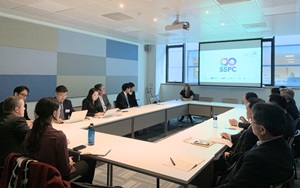KPBMA visits Ireland’s bioresearch institute, investment agency to tap potential
Officials from the Korea Pharmaceutical and Bio-Pharma Manufacturers Association (KPBMA) and local drug companies recently visited Ireland and Germany to learn how they nurtured biotech professionals and how Korean firms should enter the European market.
The KPBMA delegation visited Ireland’s National Institute for Bioprocessing Research and Training (NIBRT), IDA (Industrial Development Authority) Ireland, and CPhI, an international pharmaceutical event in Germany, from Nov. 5-9.
‘Joint project with NIBRT to secure biotech experts’

The delegation consisted of KPBMA President Won Hee-mok, Vice President Huh Kyung-hwa, Global Team Leader Lee Hong-joo, Samil Pharmaceutical Executive Director Kwon Tae-geun, Yuhan Corp. Executive Director Park Nam-jin, Ildong Pharmaceutical Director Kim Myung-hyun, Chong Kun Dang Division Head Lee Ki-soo, and Huons Division Head Oh Tae-young. They, along with NIBRT, held a news conference in Dublin.
The meeting with NIBRT focused on how to train professionals, as a follow-up on the memorandum of understanding between KPBMA and NIBRT in September. The participants discussed how Korean pharmaceutical and biotech companies could secure talents amid a severe shortage of such workforce.
Killian O'Driscoll, director of projects at NIBRT, said the Irish institute had three strong points – the training program tailored to the company's request, the opportunity to experience actual facility operation, and the implementing global pharmaceutical firms’ training.
KPMBA President Won said, “If we establish an educational institution in collaboration with NIBRT, it could become a hub to nurture biotech professionals in the Northeast Asian region.” O'Driscoll said he hoped so, too.
Finding opportunity for global biz through CDMO
The KPBMA delegation also had a meeting with IDA Ireland to check the benefits of entering the market and the local business environment. They confirmed that Korean drugmakers could take a contract development manufacturing organization (CDMO) business model in Ireland to enter Europe and the U.S.
Tommy Fanning, director of IDA Ireland’s pharma team, said, “Ireland has high productivity based on skilled employees, a production base that meets globally advanced standards, and Europe's lowest corporate tax rate of 12.5 percent.”
He urged Korean pharmaceutical and biotech firms to invest in Ireland.
As most of the multinational pharmaceutical giants have manufacturing facilities in Ireland thanks to its skilled labor, strong R&D, and various tax incentives, the CDMO model will be an option for Korean companies to expand their global business, Fanning pointed out.
For example, Chinese CDMO Wuxi Biologics is constructing a factory capable of producing 54,000 liters in Dundalk. SK Biotech also acquired a drug substance manufacturing plant in Swords last year to focus on CDMO.
An official who accompanied the Korean delegation said that while companies in advanced countries expanded their size step by step, Korean companies have limitations to do so.
Korean drugmakers will need a radical strategy to acquire existing facilities and employees altogether, the official added.

